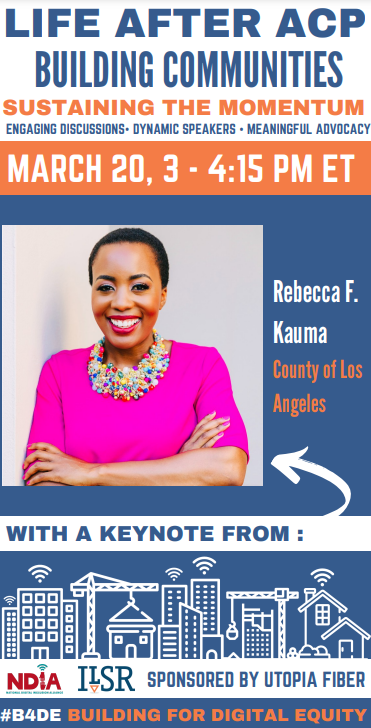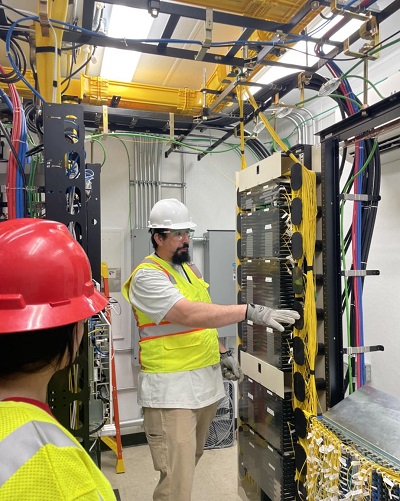
Fast, affordable Internet access for all.

If you missed our most recent Building for Digital Equity Livestream – Life After ACP – the virtual event can still be seen in its entirety (below).
The entire event focused on the imminent end of the Affordable Connectivity Program (ACP) and featured a lineup of speakers who shared on-the-ground perspectives and approaches being adopted at the community level to deal with the broadband affordability crisis in the absence of the popular federal program that has served 23 million Americans since its inception two years ago.
As a bonus, we are sharing links to the speakers slide decks below.
The first of two lightning round speakers, Margaret Käufer – President of The STEM Alliance – gave an overview on the short and long-term work her organization is doing in upstate New York in the face of ACP’s demise. You can find her slide deck here.
The second lightning round presenter Jason Inofuentes – Program Manager for the Broadband Accessibility and Affordability Office in Albemarle County, VA – unveiled an ACP supplement program his office is pursuing and how they see things moving forward. Those slides are here.
The first of the main presenters – Monica Gonzales, Digital Equity Supervisor for Methodist Healthcare Ministries in Texas – gave an overview of what her faith-based nonprofit healthcare organization is doing to address affordable connectivity across the 74 county South Texas region served by MHM. Gonzales’ slides are here.
In a recently published piece in The American Prospect, Sean Gonsalves, ILSR's Community Broadband Networks Initiative Associate Director for Communications, reports on four cities across the U.S. that are well prepared to deal with the demise of the Affordable Connectivity Program (ACP).
The article – titled "The Municipal Broadband Solution" – begins by laying out why Congress created the popular program and how letting the ACP go bankrupt undermines the national "Internet For All" Initiative now underway. However, while digital equity advocates across the nation rightly lament the demise of the program, the focus of the article is on cities that have figured out how to deliver afforable high-quality Internet access even without the ACP.
Here's a few excerpts:
Congress created the ACP to soften a harsh reality: Americans pay among the highest prices for broadband of any developed nation in the world, leaving tens of millions unable to afford internet service—something experts have long noted is a telltale sign of a broken market dominated by monopoly providers, and is at the very heart of why the U.S. digital divide is as massive as it is.
However, although federal lawmakers have known for over a year that the fund would be bankrupt by this spring, GOP congressional leaders have not budged on even bipartisan attempts to save the ACP, prompting the Federal Communications Commission (FCC) to announce in January that the agency was being forced to wind down the popular program.
It’s a major setback for the “Internet for All” effort, especially in light of a recent FCC survey that found 29 percent of ACP beneficiaries would be left without any home internet service whatsoever without the benefit, in an age when internet connectivity is a necessity for meaningful participation in 21st-century society.
Today, the first Building for Digital Equity livestream of the year will begin at 3 PM ET. The entire event will zoom in on the imminent end of the Affordable Connectivity Program (ACP) with the lineup of speakers sharing on-the-ground perspectives and approaches being adopted at the community level as they work to keep financially-strapped households connected beyond ACP.
Last minute registration are still being accepted to fill up the last few seats for the virtual gathering here.

Here’s the run-of-show:
NDIA’s Amy Huffman will set the table on where things stand with the ACP wind down process before two lightning rounds take center screen.
For the first lightning round Margaret Käufer, President of The STEM Alliance, will give an overview on the short and long-term community work her organization is doing in upstate New York in the face of ACP’s demise. That will be followed by Jason Inofuentes, Program Manager for the Broadband Accessibility and Affordability Office in Albemarle County, VA, who will spotlight an ACP supplement program his office is pursuing and how they see things moving forward.
From Colorado to Texas, municipal broadband providers continue to rack up industry accolades, not just for delivering fiber service–the gold standard of Internet connectivity–but for these networks’ ability to provide ubiquitous access across an entire community at affordable rates.
The National Association of Telecommunications Officers and Advisors (NATOA) recently announced that its Community Broadband Projects of the Year Awards for 2023 will go to the Connexion network in Fort Collins, Colorado and TeamPharr.net in Pharr, Texas.
Awarding Community-Wide Access and Affordability
The Fort Collins award is in recognition for the city having established “a municipal broadband utility created by and for the community to improve the life of all 80,000 residential and commercial properties of Fort Collins through better, more affordable Internet,” NATOA said in announcing the award.

But it wasn’t just because Fort Collins’ network provides city-wide access to fiber. The award also recognizes that “Connexion offers the fastest Internet speeds available at affordable prices (emphasis added) as well as competitive phone and TV services.”